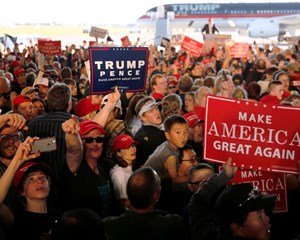In March, activists appealed to Congress to steer COVID relief money to election administration. Led by the Leadership Conference on Civil and Human Rights, more than 150 organizations signed a letter to every member of Congress seeking $2 billion in election funding. It was somewhat successful: the CARES Act, passed later that month, contained $400 million in grants to state election administrators. But the next tranche of relief funding didn't add to that number. It wasn't going to be enough.
今年3月,活动人士呼吁国会将COVID - 19救灾资金拨给选举管理部门。在民权与人权领袖会议的领导下,150多个组织签署了一封致国会每一位议员的信,要求获得20亿美元的选举资金。这在一定程度上是成功的:当月晚些时候通过的《关爱法案》(CARES Act)为州选举管理人员提供了4亿美元的拨款。但下一笔救助资金并没有增加这个数字。这还不够。
Private philanthropy stepped into the breach. An assortment of foundations contributed tens of millions in election-administration funding. The Chan Zuckerberg Initiative chipped in $300 million. "It was a failure at the federal level that 2,500 local election officials were forced to apply for philanthropic grants to fill their needs," says Amber McReynolds, a former Denver election official who heads the nonpartisan National Vote at Home Institute.
私人慈善机构填补了空缺。各种各样的基金会为选举管理提供了数千万美元的资金。陈-扎克伯格倡议也捐助了3亿美元。“2500名地方选举官员被迫申请慈善资助以满足他们的需求,这是联邦层面的失败,”前丹佛选举官员、无党派全国选举协会(National Vote at Home Institute)主席安布尔·麦克里诺兹(Amber McReynolds)表示。

McReynolds' two-year-old organization became a clearinghouse for a nation struggling to adapt. The institute gave secretaries of state from both parties technical advice on everything from which vendors to use to how to locate drop boxes. Local officials are the most trusted sources of election information, but few can afford a press secretary, so the institute distributed communications tool kits. In a presentation to Podhorzer's group, McReynolds detailed the importance of absentee ballots for shortening lines at polling places and preventing an election crisis.
McReynolds成立两年的组织变成了一个努力适应的国家的信息交流中心。该研究所向两党国务卿提供技术建议,涉及从使用哪家供应商到如何定位投递箱等各个方面。地方官员是最值得信赖的选举信息来源,但几乎没有人负担得起新闻秘书的费用,因此研究所分发了通讯工具包。在向Podhorzer的小组做报告时,mccreynolds详细阐述了缺席投票对缩短投票站排队和防止选举危机的重要性。
The institute's work helped 37 states and D.C. bolster mail voting. But it wouldn't be worth much if people didn't take advantage. Part of the challenge was logistical: each state has different rules for when and how ballots should be requested and returned. The Voter Participation Center, which in a normal year would have deployed canvassers door-to-door to get out the vote, instead conducted focus groups in April and May to find out what would get people to vote by mail. In August and September, it sent ballot applications to 15 million people in key states, 4.6 million of whom returned them. In mailings and digital ads, the group urged people not to wait for Election Day. "All the work we have done for 17 years was built for this moment of bringing democracy to people's doorsteps," says Tom Lopach, the center's CEO.
该研究所的工作帮助37个州和华盛顿特区支持邮寄投票。但如果人们不利用这一点,它就不值钱了。部分挑战是后勤方面的:每个州对于何时以及如何请求和返回选票都有不同的规定。在正常情况下,选民参与中心会派出游说者挨家挨户地动员选民投票,但今年4月和5月,中心组织了焦点小组,找出什么可以促使人们通过邮件投票。在8月和9月,它向关键州的1500万人发送了投票申请,其中460万人返回。该组织通过邮件和数字广告敦促人们不要等待选举日。该中心的首席执行官Tom Lopach说:“我们17年来所做的一切都是为了把民主带到人们家门口的这一刻。”
译文由可可原创,仅供学习交流使用,未经许可请勿转载。












